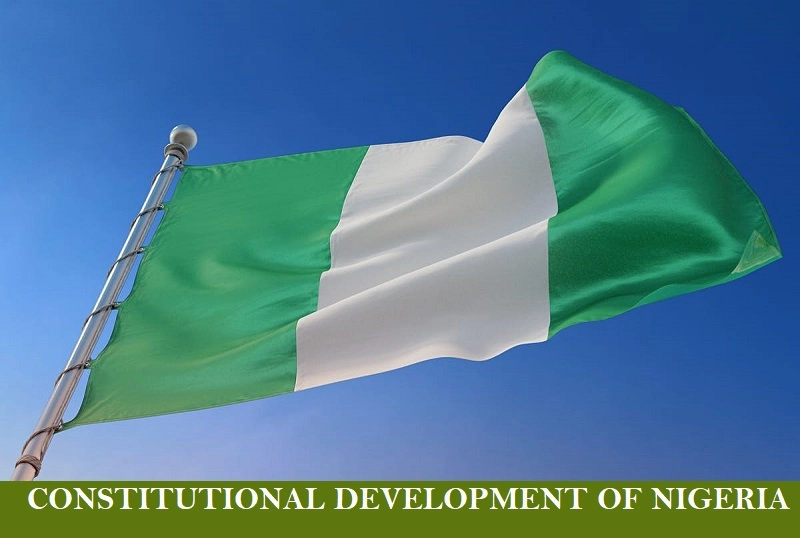Score High in JAMB With EduPadi CBT App
Practice JAMB CBT, get instant results, and understand solutions in-depth with smart AI insights.

Constitutional Development In Nigeria

Nigeria is a country located in West Africa with a rich history and diverse cultural heritage. Its constitutional development has played a significant role in shaping the nation's political and legal landscape.
In this blog post, we will explore the history of constitutional development in Nigeria, highlighting key milestones and events that have shaped the country's constitutional framework.
We will also discuss the current state of the Nigerian constitution and consider some of the challenges and opportunities it presents.
By examining the constitutional development of Nigeria, we can gain a deeper understanding of the country's past, present, and future. So, let's dive in and learn more about the constitutional development of this fascinating nation.
Brief Overview of Nigeria's History And Cultural Diversity
Nigeria is a nation located in West Africa with a population of over 214 million people, making it the most populous country in Africa. It has a diverse cultural heritage, with over 250 ethnic groups and over 500 languages spoken across the country.
Nigeria has a long and complex history, with evidence of human habitation dating back to at least 9000 BCE. The region has been home to various empires and kingdoms, including the Kingdom of Benin, the Sokoto Caliphate, and the Oyo Empire.
In the 19th century, Nigeria became a colony of the British Empire, and it gained independence in 1960.
Since independence, Nigeria has faced several challenges, including political instability, corruption, and economic difficulties.
However, it has also made significant progress in various areas, including education, healthcare, and infrastructure.
Today, Nigeria is a democratic nation with a growing economy and a diverse and vibrant culture.
RECOMMENDED: Rights of A Citizen In Nigeria You Should Know – Top 10
Pre-Colonial Era: A Brief Overview of Traditional Systems of Governance In Nigeria
Before European settlers arrived in the 19th century, Nigeria had a variety of traditional political structures.
The political, social, and economic organizations that made up these systems varied by location and ethnicity but usually served to control and plan the activities of the society.
The pivotal position of the king or ruler, who had the final say over the community, was one aspect of Nigeria's ancient systems of government that was shared by all of them.
A council of elders, who were crucial in decision-making and conflict resolution, frequently advised the ruler.
In addition to the central government, many traditional societies in Nigeria also had local systems of governance that were responsible for managing the affairs of specific clans or villages.
These systems often included leaders such as chiefs, councillors, and community representatives, who were responsible for enforcing laws and regulations, mediating disputes, and collecting taxes.
Overall, traditional systems of governance in Nigeria played a crucial role in maintaining social order and stability within the community, and many of these systems continue to influence the country's political and cultural landscape today.
The Role of Colonialism In Shaping The Country's Constitutional Development
Colonialism played a significant role in shaping the constitutional development of Nigeria. In the late 19th century, Nigeria became a colony of the British Empire, and the country was ruled by the British until it gained independence in 1960.
During this period, the British implemented several constitutional reforms in Nigeria, which had a lasting impact on the country's political and legal systems.
One of the main milestones in Nigeria's constitutional development during this period was the creation of the Lugard Constitution in 1914, which established a system of dual governance in Nigeria, with separate systems of administration for the northern and southern regions of the country.
Other significant constitutional reforms during this period included the Macpherson Constitution of 1951, which introduced a system of parliamentary democracy in Nigeria, and the Independence Constitution of 1960, which established the framework for an independent Nigerian state.
Overall, colonialism had a profound impact on Nigeria's constitutional development, and many of the constitutional principles and structures introduced during this period continue to shape the country's political and legal landscape today.
Colonial Era: Overview of Nigeria's Constitutional History Under British Rule
Nigeria's constitutional history under British rule was marked by a series of reforms and milestones that shaped the country's political and legal landscape.
Some of the key events and reforms during this period include:
- The Lugard Constitution of 1914: This constitution established a system of dual governance in Nigeria, with separate systems of administration for the northern and southern regions of the country.
- The Richards Constitution of 1946: This constitution introduced a system of indirect rule in Nigeria, which gave greater autonomy to traditional rulers and local authorities.
- The Macpherson Constitution of 1951: This constitution introduced a system of parliamentary democracy in Nigeria, with a bicameral legislature and an independent judiciary.
- The Independence Constitution of 1960: This constitution established the framework for an independent Nigerian state and provided for a federal system of government with a ceremonial President and a Prime Minister responsible for the administration of the country.
Overall, these constitutional reforms played a significant role in shaping Nigeria's political and legal landscape and set the stage for the country's transition to independence in 1960.
Independence and Post-Colonial Period: Overview of Nigeria's Transition To Independence In 1960
Nigeria gained independence from British rule on October 1, 1960. This marked the end of a long and complex constitutional development process in the country, which had been shaped by colonialism, nationalism, and political struggle.
During the period leading up to independence, Nigeria underwent a series of constitutional reforms that helped to establish the framework for an independent state.
These reforms included the Macpherson Constitution of 1951, which introduced a system of parliamentary democracy, and the Independence Constitution of 1960, which provided for a federal system of government with a ceremonial President and a Prime Minister responsible for the administration of the country.
Nigeria's transition to independence comes with several challenges, including political tensions, ethnic conflicts, and economic difficulties.
However, it was also a time of great hope and optimism, as many Nigerians believed that independence would bring new opportunities and a brighter future for the country.
In the years following independence, Nigeria faced several challenges as it sought to establish a stable and prosperous democracy.
Despite these challenges, it has made significant progress in various areas, including education, healthcare, and infrastructure, and it remains a vibrant and diverse nation with a rich cultural heritage.
RECOMMENDED:Citizenship Education In Nigeria: Types Role, Goals & Benefits
A Brief Overview On The 1960 Independence Constitution And The 1979 Constitution
After Nigeria earned independence from British sovereignty in 1960, it was governed under the 1960 Independence Constitution.
With a ceremonial President and a Prime Minister in charge of running the country, this constitution established a federal system of government.
The powers and duties of the four organs of government were also delineated, along with a bicameral legislature and an independent judiciary.
The following significant constitutional framework in Nigerian history was the 1979 Constitution. It was put into place after a military coup overthrew the civilian administration in 1976.
A presidential system of government with a powerful executive branch and a unicameral legislature was established under the Constitution of 1979.
It also introduced several other significant changes, such as the creation of states and the devolution of powers to the states.
Overall, both the 1960 Independence Constitution and the 1979 Constitution played a significant role in shaping the political and legal landscape of Nigeria. And they continue to influence the country's constitutional framework today.
Overview Of The 1999 Constitution
The 1999 Constitution is the current constitutional framework of Nigeria. It was adopted following the return to civilian rule in 1999 and has since been amended several times.
Some of the main features and provisions of the 1999 Constitution include:
- A presidential system of government with a strong executive branch and a bicameral legislature (comprising the Senate and the House of Representatives)
- A federal system of government with powers divided between the federal government and the states
- A system of independent checks and balances, including an independent judiciary and the office of the Auditor-General
- Provisions for the protection of human rights and the promotion of social justice
- Provisions for the establishment of several institutions, such as the National Assembly, the National Judicial Council, and the Independent National Electoral Commission.
Overall, the 1999 Constitution plays a crucial role in defining the structure and powers of the government in Nigeria and in safeguarding the rights and freedoms of its citizens.
It is an important document that shapes the political, legal, and social landscape of the country.
Benefits And Challenges Facing The Nigerian Constitution Today
Benefits
1. Legal protection of human rights.
2. A framework for democratic governance.
3. A federal system of government.
4. Promotes stability and predictability.
5. Protects diversity and promotes unity.
6. Encourages economic growth and development.
Challenges
1. Political instability.
2. Corruption
3. Lack of implementation.
4. Limited access to justice.
5. Poverty and inequality.
6. Ethnic and regional tensions.
Conclusion
Over the years, significant improvements and milestones added to Nigeria's constitutional development process.
Nigeria's constitutional framework has changed dramatically since the Lugard Constitution of 1914 to the current Constitution of 1999, reflecting the nation's shifting political and social climate.
The Nigerian constitution has been essential in defining the makeup and scope of the government as well as protecting citizens' rights and liberties throughout this process.
Additionally, it has had to deal with several difficulties, including political unrest, crime, and social and economic inequality.
The Nigerian constitution continues to play a significant role in establishing the nation's political, legal, and social framework despite these difficulties.
The government and other stakeholders must continue to work towards strengthening the constitutional framework and addressing the challenges that face the country.
This will help to ensure that the rights and freedoms of all Nigerians are protected and that the country continues to thrive and progress.


